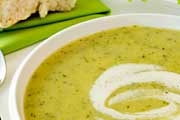Healthy Eating for Seniors
There's no doubt that eating healthy can have a tremendous impact on how we age and the quality of our life as we do. Studies show that with a healthy, Mediterranean-style diet, you can reduce your risk of heart disease, stroke, cancer, diabetes and more.
It's never too late to start eating healthy, and on this page you'll find the resources you need to eat great food while eating healthy for the long term.
Top Resources for Seniors
 Diabetes
Diabetes
For diabetics, eating well is THE key to controlling blood sugar. For those with Type 2 diabetes, The Mediterranean Diet can help you control your diabetes better, without medication. The Diabetes Diet
 Coumadin
(warfarin)
Coumadin
(warfarin)
If you're taking Coumadin, you need to manage your intake of Vitamin K carefully. This guide will help you manage your diet while still eating great food. Lists of foods that are high (and low) in Vitamin K, Coumadin-safe recipes and more! Coumadin (warfarin) Diet Information
 Low Sodium Diet Guide
Low Sodium Diet Guide
Being on a salt-restricted diet doesn't mean giving up flavor. Discover Dr. Gourmet's Guide to a Low Sodium Diet and his hundreds of low sodium recipes. Delicious, low-sodium meals are yours again!
 The
Importance of Exercise
The
Importance of Exercise
Being active is one of the best ways to help maintain a healthy weight. It also helps to maintain bone mass and can help keep your mind alert. Join Jacques Courseault, M.D. as he shares with you simple exercises that you can do at home, with minimal or no equipment.
Read the Research
Articles from DrGourmet.com
Metabolic syndrome and Alzheimer's
Metabolic syndrome has been defined as a combination of the following
factors: abdominal obesity, high blood pressure, high blood glucose levels,
and poor cholesterol scores (including high triglycerides and low levels of
HDL, or good cholesterol).
Dietary Fat and the Risk of Alzheimer's Disease
It has become clearer and clearer that diets high in saturated fat
and trans fats are associated with health problems. Recently
a very well designed study shows a clear connection between Alzheimer's
Disease and an increased intake of saturated and trans fat.
Avoid Alzheimer's - drink your juice!
Recent studies have suggested that antioxidant vitamins from fruits and vegetables (not from supplements) may help delay the onset of Alzheimer's disease. Other than vitamins, the most abundant source of antioxidants in foods are substances known as polyphenols that are primarily found in the skin or rind of fruits and vegetables. The method of preparation of these foods then has a big impact on the amount of polyphenols in the resulting cooked food.
Mediterranean Diet and Alzheimer's Disease
Being able to reproduce the results of a study is key to verifying any conclusions drawn from research. A number of years ago a group of scientists claimed to have mastered "Cold Fusion," but in followup experiments no one has been able to reproduce such an effect. Dr. Nikolaos Scarmeas and his colleagues published a study this year on a group of elderly subjects that indicated eating a Mediterranean style diet resulted in a lower risk of Alzheimer's Disease.
Read More Health and Nutrition Bites from Dr. Gourmet: Real Research Translated for Your Life!
4 Diet Changes That Add Up To Better Health
A recent round of studies looking at potential health benefits from four
nutrients or food groups - chocolate, olive oil, whole grains and vitamin
D - show that making small yet significant changes to your diet can reduce
the risks of certain chronic diseases while protecting you from others.
Necessary Nutrients & How
Seniors Can Get Them
While studies will continue to debate whether certain foods or specific
vitamins and minerals can prevent cancer and other diseases, one thing
is clear: Eating a diet that provides these nutrients is certainly healthier
for you than not. On the most basic level, the body needs vitamins and
minerals just to function.
More Articles from DrGourmet.com
The Effects of Being Healthy
Most studies that I've reported on here in my Health and Nutrition Bites are focused on the risks of negative health factors such as being overweight or obese, having a high Waist to Hip ratio, being inactive or smoking. Those studies tell you that having those risk factors mean you're more likely to become seriously ill or die and give you all sorts of percentages - 40% more likely to have a heart attack or 30% more likely to die of all causes and so on and so on and so on.
